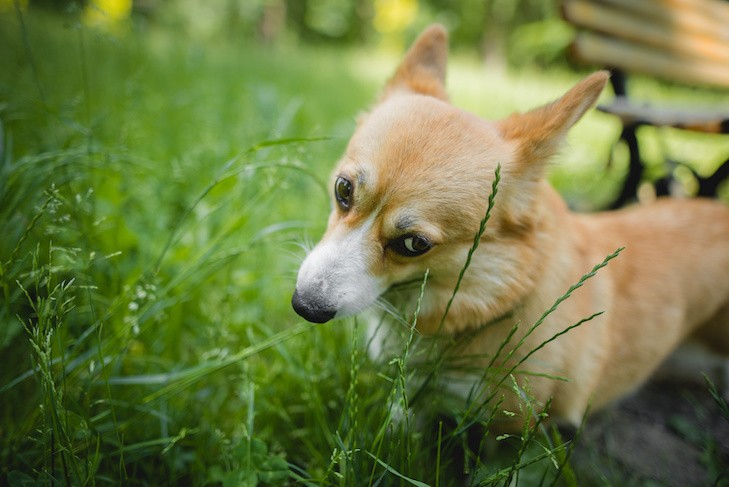Of all the perplexing and sometimes unpleasant habits our canine companions exhibit – from lapping from the toilet bowl to indulging in a roll in who-knows-what – perhaps none is as off-putting to dog owners as coprophagia, or the eating of poop. While a dog’s foray into fecal feasting isn’t motivated by a desire to disgust their human family, the act itself often evokes strong feelings of revulsion in us. In fact, the discovery of a dog’s poop-eating behavior is, sadly, sometimes a reason cited when owners consider rehoming or even euthanasia. If you’re facing this challenge with your dog, take heart. There are effective strategies, rooted in behavior modification, to discourage this behavior, along with readily available products designed to make poop less appealing to your dog.
Decoding Coprophagia: Why Dogs are Drawn to Dung
Coprophagia, pronounced kop-ruh-fey-jee-uh, is the scientific term for the act of eating feces. The motivations behind this behavior in dogs are complex, encompassing both behavioral and physiological factors. While in-depth scientific exploration of canine coprophagia is still ongoing, it’s recognized as a relatively common phenomenon. A revealing study presented at the American Veterinary Society of Animal Behavior annual conference by researchers at the University of California, Davis, led by Dr. Benjamin Hart, shed light on the prevalence of this behavior:
- A significant 16% of dogs were classified as “serious” poop eaters, meaning they were observed in the act at least five times.
- An even larger group, 24% of dogs in the study, were seen eating poop at least once.
Dr. Hart proposed an evolutionary explanation for this behavior, stating, “Our conclusion is that eating of fresh stools is a reflection of an innate predisposition of ancestral canids living in nature that protects pack members from intestinal parasites present in feces that could occasionally be dropped in the den/rest area.” In simpler terms, the inclination to eat poop might be ingrained in a dog’s DNA, a holdover from their scavenging ancestors.
The study, based on surveys of approximately 3,000 dog owners, highlights that while repulsive to human sensibilities, poop eating is not necessarily considered “gross” from a canine perspective. Dogs evolved as opportunistic scavengers, consuming whatever they could find, be it from the ground or a garbage heap. Their definition of palatable differs significantly from ours. Animal behaviorist Steven R. Lindsay, in his “Handbook of Applied Dog Behavior and Training,” suggests coprophagia could be “one of several appetitive survival behaviors that have evolved to cope with the periodic adversity of starvation.” When resources were scarce for their ancestors, being selective about food was not an option.
Is Eating Poop Normal Dog Behavior?
In certain species, such as rabbits, coprophagia is not just normal, but essential for nutrient acquisition. Rabbits engage in this practice to obtain vital nutrients, and preventing it can lead to health issues, particularly in young rabbits who may fail to thrive. Fortunately, dogs do not have this same nutritional dependence on feces. However, eating poop is considered a normal and natural behavior in dogs during specific life stages.
Mother dogs instinctively lick their puppies to stimulate elimination and diligently clean up their waste by consuming it for approximately the first three weeks postpartum. Puppies themselves also naturally exhibit coprophagic behavior, eating their own poop (autocoprophagia), the poop of other dogs (allocoprophagia), and even feces from cats and other animals. Some dogs develop a particular fondness for horse manure and goose droppings.
While eating their own poop is generally not harmful to puppies, consuming feces from other animals carries potential health risks. If the ingested stool is contaminated with parasites, viruses, or toxins, it can lead to illness in the puppy. In most cases, this puppy-stage poop-eating behavior tends to diminish and eventually disappear by the time the puppy reaches around nine months of age.
Alt text: Pembroke Welsh Corgi happily munches on grass in a sunny park, illustrating normal canine scavenging behavior.
Unpacking the Reasons Behind Adult Dog Coprophagia
If your adult dog suddenly develops a poop-eating habit, it’s crucial to consult with your veterinarian to rule out any underlying medical conditions. Several health issues can trigger or exacerbate coprophagia, including:
- Parasites: Intestinal parasites can lead to nutrient malabsorption, potentially prompting a dog to seek out nutrients in feces.
- Malabsorption Syndromes: Conditions that hinder nutrient absorption can also lead to dietary deficiencies and subsequent coprophagia.
- Diabetes, Cushing’s Disease, and Thyroid Disease: These endocrine disorders can cause increased appetite, which may manifest as poop eating in some dogs.
- Nutrient or Calorie Deficiencies: Diets lacking essential nutrients or sufficient calories can drive dogs to consume feces in an attempt to compensate for these deficiencies.
- Certain Medications: Drugs like steroids can also increase appetite as a side effect, potentially contributing to coprophagia.
Beyond medical reasons, environmental stress and behavioral factors can also play a significant role in adult dogs eating poop.
Environmental and Behavioral Triggers for Coprophagia
-
Isolation: Studies have indicated that dogs kept in isolation, such as in kennels or basements, are more prone to coprophagia compared to dogs living in close proximity to their human families. Lack of social interaction and environmental enrichment could contribute to this behavior.
-
Confinement to Small Spaces: Prolonged confinement in restricted spaces can also trigger poop eating. This is often observed in dogs rescued from overcrowded animal shelters, where stress and limited space are factors.
-
Anxiety: Harsh or punishment-based house training methods can inadvertently contribute to coprophagia. Dogs may eliminate and then eat their own feces in an attempt to eliminate the “evidence” and avoid punishment, creating a negative cycle.
Alt text: A forlorn Golden Retriever lies on the grass, conveying the potential anxiety and stress that can contribute to behavioral issues like coprophagia in dogs.
-
Attention-Seeking: Dogs are astute at learning how to elicit reactions from their owners. Eating poop guarantees a reaction, often a strong one. If a dog discovers this behavior gains them attention, even negative attention, they may repeat it. It’s crucial to avoid overreacting if you witness your dog eating poop.
-
Inappropriate Association with Food: Feeding dogs in close proximity to their elimination areas can lead to an unfortunate association between food odors and fecal odors. This can blur the lines for the dog and lead to them misinterpreting feces as a food source. Feeding and potty areas should always be distinctly separate.
-
Smelling Poop on Their Mothers: Animal behaviorist Lindsay proposes that puppies might become confused by detecting fecal odors on their mother’s breath after she has cleaned them. Additionally, mothers might occasionally regurgitate food mixed with puppy feces. He terms this an “appetitive inoculation,” which could predispose a puppy to developing coprophagia.
Alt text: A Cocker Spaniel mother attentively sits beside her puppy outdoors, illustrating the close maternal bond and early life influences that can shape puppy behaviors.
- Living with a Sick or Elderly Dog: In multi-dog households, a healthy dog might consume feces from a weaker or incontinent dog. Scientists speculate this could be linked to an instinct to protect the pack from predators by eliminating scent trails associated with illness or vulnerability.
Strategies to Stop Your Dog From Eating Poop
Addressing coprophagia requires a multifaceted approach, and the most effective strategies often depend on the underlying cause. Dogs eating poop due to a medical condition will need different interventions compared to those doing it for behavioral reasons. Consulting your veterinarian is the first step in addressing this issue. They can rule out medical causes and potentially refer you to a veterinary behaviorist if the problem is behavioral.
Several strategies have shown promise in curbing poop eating in dogs:
Dietary and Supplement-Based Solutions
-
Vitamin Supplements: A long-held theory suggests that dogs eat poop to compensate for dietary deficiencies. Vitamin-B deficiency, in particular, has been implicated, with research indicating that fecal microbial activity synthesizes thiamine (a B vitamin). Supplementing with a dog multivitamin may be beneficial.
-
Enzyme Supplements: Modern canine diets, often higher in carbohydrates and lower in meat-based proteins and fats compared to ancestral diets, might contribute to digestive enzyme deficiencies. Some dog owners have reported success using digestive enzyme supplements for dogs, including products containing papain, a digestive enzyme.
Taste Aversion and Deterrents
- Taste-Aversion Products: The principle behind these products is to make feces taste and smell as repulsive to dogs as poop eating is to humans. Poop-eating deterrent treats or deterrent powders added to food aim to make the resulting poop unpalatable. Common ingredients include monosodium glutamate, chamomile, pepper-plant derivatives, yucca, garlic, and parsley. Crucially, if you use these products, all dogs (and cats) in the household need to consume them to ensure all feces are equally deterrent. Bitter-tasting sprays can also be directly applied to feces to make it less appealing.
Alt text: A close-up of a Pug with expressive, sad puppy eyes, highlighting the importance of addressing behavioral issues with empathy and understanding.
Environmental Management and Training
-
Environmental Cleanliness: Maintaining a clean living environment for your dog is paramount. This includes regularly cleaning your yard to eliminate any piles of poop that could become tempting targets.
-
Supervision and Immediate Poop Removal: When walking your dog, supervise them closely and immediately pick up their feces to prevent them from having the opportunity to eat it.
-
Training “Leave It” and “Come” Cues: Mastering the “leave it” and “come” commands is invaluable in managing coprophagia. A simple training exercise involves teaching your dog to “come” to you for a treat immediately after defecating. This helps them associate eliminating with a positive reward from you, rather than focusing on the feces on the ground.
-
Cat Litter Box Management: If you have cats, ensure the litter box is either kept meticulously clean or placed completely out of your dog’s reach. Consider self-cleaning litter boxes or use a dog gate to restrict access to the litter box, as cat feces are often particularly enticing to dogs.
Interesting Facts About Canine Coprophagia
Coprophagia in puppies is often viewed as a normal part of their exploratory phase as they investigate the world around them. While many puppies are content with sniffing and examining poop, some are inclined to mouth everything, including feces.
A curious observation is that dogs rarely consume soft, poorly formed stools or diarrhea. Their attraction seems to be primarily to firm stools. Frozen poop, in particular, appears to be a highly desirable “treat” for dogs who engage in coprophagia. Dr. Hart’s study revealed additional interesting insights:
- Coprophagia is more prevalent in multi-dog households. In single-dog homes, around 20% of dogs exhibited poop-eating behavior, whereas in homes with three or more dogs, this rose to 33%.
- Dogs who eat poop are not inherently more difficult to house train than other dogs.
- Female dogs are more likely to engage in coprophagia, while intact males are the least likely.
- A significant 92% of poop eaters prefer fresh poop, only one to two days old.
- 85% of dog poop eaters primarily consume feces from other dogs, not their own.
- Dogs who are greedy eaters and prone to stealing food are also more likely to be poop eaters.
If you observe your dog eating poop, consulting your veterinarian is crucial to determine the underlying causes. Identifying the “why” behind your dog’s coprophagia is key to implementing the most effective solutions and taking the necessary steps to help them break this undesirable habit.

